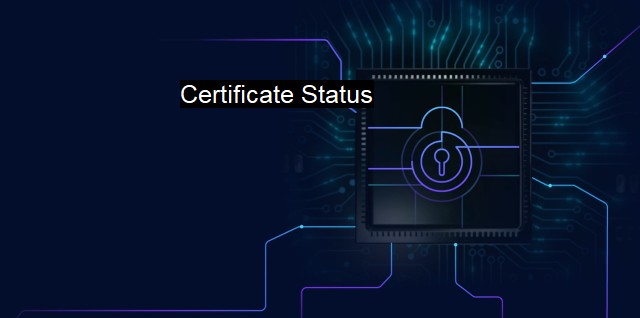What are Certificate Status?
Cybersecurity and Antivirus: Understanding the Critical Importance of Certificate Status for Trust and Security
"Certificate Status" refers to the current validity of a digital certificate. Digital certificates play an essential role in facilitating secure communication and transactions over the internet. They also authenticate entity identities online to prevents frauds and enhances web users' trust. Thus, the status of these certificates directly influences the system's overall security and privacy, making it a vital aspect of web cybersecurity.Understanding what 'certificate status' represents necessitates familiarizing oneself with the concept of digital certificates. They are electronic documents issued by a Certificate Authority (CA) that bind a public encryption key with identities, commonly in the domains of websites, individuals, or businesses. Digital certificates provide the necessary assurance that parties participating in web-based transactions are indeed what or who they claim to be, resulting in safer web interactions.
Hence, 'certificate status' is the condition or state of these digital certificates, whether active, expired, revoked, or otherwise. The integrity of the certificate, and therefore its status, is pivotal for cybersecurity because cyber-attacks often involve exploiting security vulnerabilities, one of which could easily be inactive or compromised certificates.
Certificate statuses can be divided broadly into two: valid and invalid.
1. Valid: This status signifies that the certificate is duly issued, hasn't expired, hasn’t been revoked, and is currently binding the identities as intended. A valid status indicates that the web browser can trust the certificate, allowing encrypted communication between the browser and the web server.
2. Invalid: This status denotes that a certificate can no longer be trusted and thus should not be used to authenticate the identity of the proposed entity or to facilitate encrypt transactions. Invalid statuses include:
- Expired: The certificate's validity period has ended.
- Revoked: The certificate has been illegitimately or erroneously issued, or it has been compromised through suspected or actual key loss.
- Could not be found: The certificate could not be located in the Certificate Repository.
- Unknown: The status couldn't be determined due to particular reasons like system deficiencies or networking issues.
Managing and determining the certificate status is usually implemented through two standard protocols: the Certificate Revocation List (CRL), and the Online Certificate Status Protocol (OCSP).
CRL is a list maintained and periodically updated by the Certificate Authority (CA) containing the serial numbers of all the revoked or invalid certificates. Alternatively, OCSP is real-time queries where the system checks on valid repositories of the Certificate Authority (CA) to immediately verify the status certificate.
Similarly, managing and maintaining the correct certificate status is critical to cybersecurity. Invalid or compromised certificates can lead to severe consequences, including data breaches and identity theft, leading to tangible financial losses. website owners and users may lose trust in a system or online platform if there are consistent issues related to certificate validity.
"certificate status" is an integral cog in the entire security apparatus, pivotal in ensuring safe and secured web transactions or communications. Thus, due diligence must be carried out by cybersecurity and antivirus practitioners to ensure their statuses are regularly checked and maintained in optimal function for web security and a healthy cybersecurity ecosystem.

Certificate Status FAQs
What is certificate status in cybersecurity?
In cybersecurity, a certificate status refers to the status information of digital certificates used for various purposes such as secure communication, identification, and authentication.Why is certificate status important in antivirus software?
Antivirus software checks the certificate status of programs and files to ensure that they are safe and trusted. By checking the certificate status, antivirus software can determine whether a program or file has been tampered with or is potentially harmful.How can I check the certificate status of a website?
You can check the certificate status of a website by clicking on the padlock icon in the address bar of your web browser. This will display information about the website's certificate status, such as whether it is valid and trusted.What should I do if I encounter an invalid certificate status warning?
If you encounter an invalid certificate status warning, do not proceed to the website or download any files associated with the warning. Instead, contact the website administrator or IT support to confirm the certificate status and ensure that it is safe to proceed.| | A | | | B | | | C | | | D | | | E | | | F | | | G | | | H | | | I | | | J | | | K | | | L | | | M | |
| | N | | | O | | | P | | | Q | | | R | | | S | | | T | | | U | | | V | | | W | | | X | | | Y | | | Z | |
| | 1 | | | 2 | | | 3 | | | 4 | | | 7 | | | 8 | | |||||||